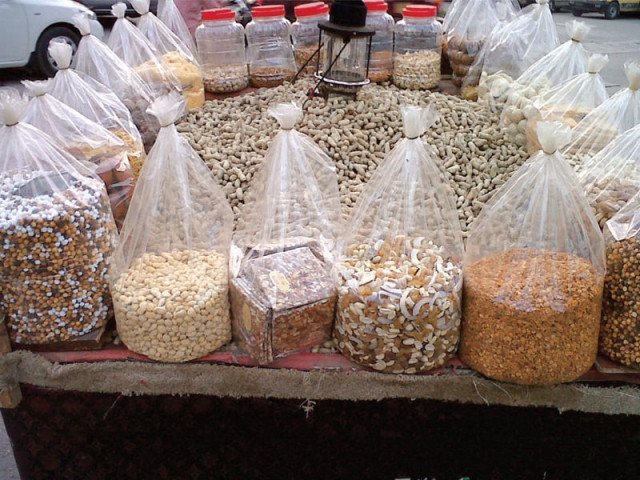Dry fruit prices become tough nut to crack
Traders blame cold weather and short supplies for sharp rise

PHOTO: TEHREEM AIDRUS
With sky-rocketing prices, dry fruits have practically gone beyond the reach of many people. Prices of dry fruits in the city and its adjoining areas are high compared to markets located in areas where it is available in abundance. On top of the price chart in Rahim Yar Khan is the price of pine nuts, locally known as chilghoza.
The small wonder is selling for approximately Rs3,500 per kg, but in the areas where it is grown, it is sold at the half price of Rs1,500 per kg. The prices of other dry fruits like almonds, cashew nuts, pistachios, and walnuts have risen sharply, along with a corresponding increase in demand. The rates in market of origin are doubled when the commodity reaches the city.
Almonds are being sold at Rs1,400 per kg, while cashew nuts are being sold at Rs2,000 per kg. Similarly, walnuts are sold at Rs1,300 per kg whereas the price of figs has been set at Rs1,400 per kg. Meanwhile, dry fruit prices are even higher at superstores where these items are sold in attractive packaging.
Traders blame the cold weather and short supplies from Afghanistan and Iran from where imports have slowed down in arrivals through illegal channels and smuggling after border checks. During winter, people present dry fruits to their guests.
In the chilly weather, the number of vendors selling dry fruits has also increased as they can be seen along every roadside near bus stands and in markets. However, with the increasing demand, the prices of dry fruits have also increased manifold and buying them has become only a dream for people from low-income groups.
The most favourite and popular dry fruit thus remains the peanut which is being sold for Rs250 instead of Rs150 per kg. Vendors serving hot peanuts, roasted in sand, are part of the winter charm in the city. Late night gatherings of friends and family are usually seen as incomplete without peanuts.



















COMMENTS
Comments are moderated and generally will be posted if they are on-topic and not abusive.
For more information, please see our Comments FAQ